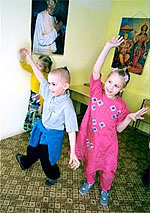EUROPE
April 17, 2003 VNN7992

Hare Krishna Offer An Alternative Kind Of School

FROM THE MOSCOW TIMES

 MOSCOW, Apr 17 (VNN) — By Avery Johnson - Special to The Moscow Times MOSCOW, Apr 17 (VNN) — By Avery Johnson - Special to The Moscow Times
It's a regular school day at the Moscow Bhaktivedanta Gurukula.
Students sit cross-legged on the cafeteria floor with colorful robes wrapped artfully around their knees, balancing steaming bowls of vegetarian food.
The slow, somber melody of cymbals and a harmonium wafts in from the adjacent prayer room, where the fifth-grade boys are practicing a traditional Begali song.
In the classrooms, girls with long braids and boys with shaved heads and Shikhha tails rise smiling to greet newcomers. Their hands are clasped in the prayer position Pranam.
Bhaktivedanta Gurukula is an accredited Russian school, but it certainly is not a typical one.
The school takes its name from A.C. Bhaktivedanta Swami Prabhupada, the founder of the International Society for Krishna Consciousness, or ISKON, an evangelical offshoot of the Hindu branch religion Hare Krishna.
"The difference is that we teach the children about spirituality and behavior right from the beginning," said Sanjeet Kumar Jha, the school's major benefactor and chairman of its board of directors.
"Schools in Russia have problems with drugs, alcohol and violence," he said. "Our school is an alternative."
Bhaktivedanta Gurukula has been educating students for 12 years using a curriculum that includes classes on ancient Indian literature and philosophy, Sanskrit and traditional South Asian instruments, but also meets Russian state standards.
"Our teachers lead by example. While not all of them are Hare Krishna, none of them drink or smoke, and they are vegetarians," said Jha, whose Krishna name is Sadhu Priya Das.
The student body, from preschool to grade 11, numbers around 70. ISKON's Moscow mission finds many pupils for the school through its charity and outreach programs.
"We try to help Russians who are from broken houses, from orphanages, not only materially, but to help them be happy for a lifetime," Jha said.
Classes are held in Russian, which Jha said has discouraged many South Asian expatriates from enrolling their children. Except for two Indian children, the students are Russian.
But they are not all Hare Krishna.
School director Irina Yakimechko, who became a Hare Krishna after she married a devotee, said some students are from other Hindu offshoots and others are Muslim or Russian Orthodox.
"The school was started by Hare Krishna, and when their neighbors and friends saw how well the children were doing, they wanted their children to study here too," she said. "We have children from many different faiths."
Nastya Shugina, a 10th grader whose family is Russian Orthodox, said she feels comfortable in the predominantly Hare Krishna environment.
"It's not a problem," she said. "I'm still making up my mind what I believe. I do know that the atmosphere is a lot better here than at my old school, where the students smoked and drank. Here there are good relations between people."
Fourth-grader Anna Pravdolubova, who also comes from a Russian Orthodox family, said the school has a good spiritual feeling. Her classmates nodded in support.
Balaram Korzun, an orphaned second-grader, said through missing teeth that the school offers him friendship.
Throughout the warren of classrooms, small groups of students study beneath brightly colored posters of Hindu deities, woven tapestries and homemade art.
Yakimechko said high academic standards more than spirituality make the school unusual.
She said it's not uncommon for 11th graders to score fours or fives on the state high school exit exam.
"I would say our English instruction is better than in other Russian schools because we start the children earlier, at the preschool level," she said. "We also stress information technology earlier and incorporate it into the curriculum starting seriously in the fifth grade.
"And of course, we stress Indian culture."
She said the school does not teach religious beliefs, but rather behavior and philosophy.
The Hare Krishna seek purity of mind and devotees vow to follow four rules: no gambling, no intoxicants, no meat and no illicit sex.
An evangelical religion, Hare Krishna was introduced to the Soviet Union by its founder in 1971 and was registered as a Russian religion in 1991. There are now more than 100,000 practitioners in over 20 Russian cities. The temple on Khoroshyovskoye Shosse has more than 10,000 members, Jha said.
Yakimechko said Russians are increasingly turning to religion to help them make sense of their lives.
"Russia has been going through a hard time after the destruction of the state ideology, and I think that contributes a lot to the popularity of religion in general, but to Hare Krishna in particular," she said.
The school, like the Hare Krishna religion in Russia, has been hassled by the government in the past but is enjoying a new era of freedom.
Jha said that getting accreditation from the Education Ministry was extremely difficult at first because the government was suspicious of the school's uncommon agenda. But the ministry has since leased it a small green-and-white building and provides a little money.
Contact VNN about this story Send this story to a friend Send this story to a friend This story URL: http://www.vnn.org/europe/EU0304/EU17-7992.html
NEWS DESK | EUROPE | TOP
Surf the Web on

|







